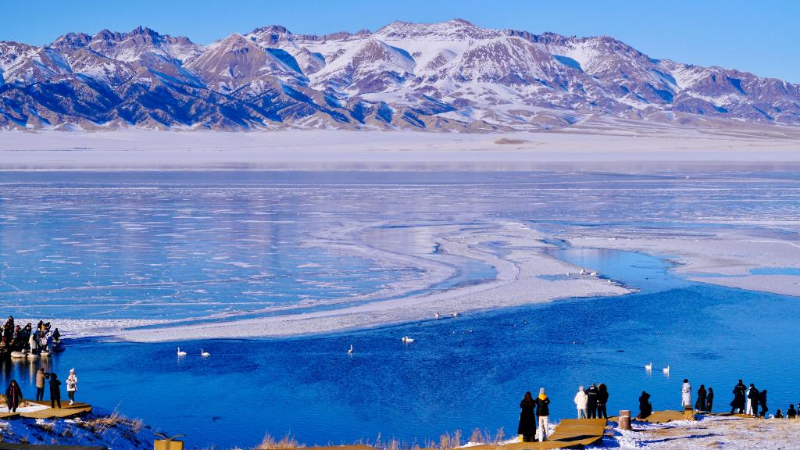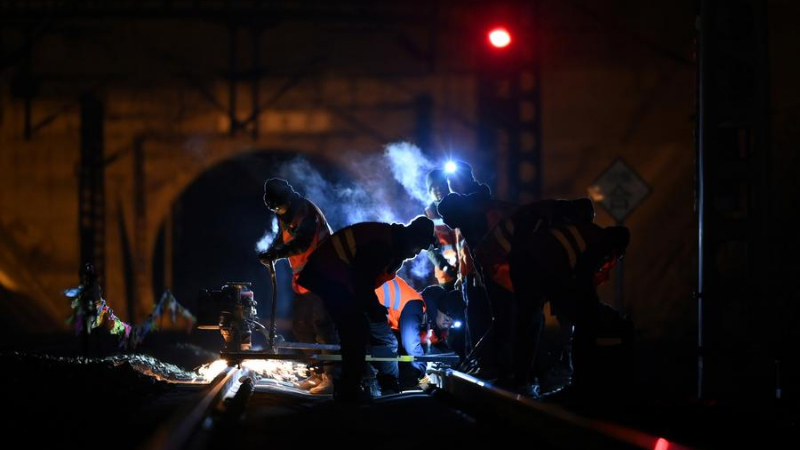Xinhua Headlines: Israel, Hamas agree to ceasefire, ushering in hope for Gaza peace
Source: Xinhua
Editor: huaxia
2025-01-16 17:51:32
*The ceasefire agreement has brought a rare moment of hope for peace to the war-ravaged Gaza Strip and the wider Middle East.
*The first stage, which lasts for 42 days, includes a ceasefire, the withdrawal and redeployment of Israeli forces outside densely populated areas, the release of hostages and exchange of prisoners and detainees, the exchange of the remains of the deceased, the return of internally displaced persons to their places of residence in Gaza, and facilitating the departure of patients and the wounded to receive treatment.
*While the widely-anticipated deal represents a step toward restoring peace in the region, analysts argue that, since it does not address the deep-seated issues fueling the Israel-Palestine conflict, the path to long-lasting peace in the Middle East remains fraught with uncertainty.
DOHA/GAZA, Jan. 16 (Xinhua) -- A ceasefire agreement between Israel and Hamas in Gaza has been reached, offering a glimmer of hope for ending the 15-month-old bloodshed in the enclave.
In a press conference on Wednesday in Doha, where the truce talks were held, Qatari Prime Minister and Foreign Minister Sheikh Mohammed bin Abdulrahman bin Jassim Al Thani said the agreement, which will take effect on Sunday, includes the exchange of hostages and prisoners and return to sustainable calm that would lead to a permanent ceasefire in Gaza.
While the widely-anticipated deal represents a step toward restoring peace in the region, analysts argue that, since it does not address the deep-seated issues fueling the Israel-Palestine conflict, the path to long-lasting peace in the Middle East remains fraught with uncertainty.
THREE-PHASED CEASEFIRE
According to the mediators, which include Qatar, Egypt and the United States, the agreement consists of three phases towards a "permanent ceasefire between the parties."
The first stage, which lasts for 42 days, includes a ceasefire, the withdrawal and redeployment of Israeli forces outside densely populated areas, the release of hostages and exchange of prisoners and detainees, the exchange of the remains of the deceased, the return of internally displaced persons to their places of residence in Gaza, and facilitating the departure of patients and the wounded to receive treatment.
The first stage also includes intensifying the safe and effective entry and distribution of humanitarian aid on a large scale throughout the Gaza Strip, rehabilitating hospitals, health centers and bakeries, bringing in civil defense supplies and fuel, and bringing in shelter supplies for displaced persons who lost their homes due to the war.
The details of the second and third phases will be announced after the completion of the first phase of the agreement.
RARE MOMENT OF HOPE FOR PEACE
The ceasefire agreement has brought a rare moment of hope for peace to the war-ravaged Gaza Strip and the wider Middle East.
"I welcome the announcement of a deal to secure a ceasefire and hostage release in Gaza," United Nations (UN) Secretary-General Antonio Guterres said in a statement.
"This deal is a critical first step, but we must mobilize all efforts to also advance broader goals, including the preservation of the unity, contiguity and integrity of the Occupied Palestinian Territory," Guterres added.
Arab League Secretary-General Ahmed Aboul-Gheit also welcomed the ceasefire deal, calling for strict adherence to the terms of the agreement.
"The agreement must lead to a complete and final cessation of the Israeli war on Gaza," Aboul-Gheit said in a statement.
"Many have been hoping for this moment for the past 15 months," Philippe Lazzarini, commissioner-general of the UN relief agency for Palestinian refugees, known as UNRWA, said on X.
As the agreement finally came through after multiple rounds of negotiations, Gazans took to the streets to express their excitement and relief over the truce.
"Now, we can sleep without fearing more loss," said Fatima Abu Riash, a displaced mother of three from Deir al-Balah in central Gaza.
As the ceasefire draws near, many Palestinians are remembering their loved ones who lost their lives in the conflict.
Ever since Israel launched its large-scale offensive against Hamas in Gaza in response to the latter's sudden attack on the southern Israeli border on Oct. 7, 2023, more than 46,000 Palestinians have been killed in the conflict.
"I am grateful for the ceasefire, but I cannot forget those killed or the destruction of my home," Mohammed Abu Ramadan, a father of six from Gaza, said as he joined the street celebrations.
CHALLENGES REMAIN
The timing of the ceasefire deal coincided with changes in the broader regional landscape, said Nimrod Goren, president of Mitvim, the Israeli Institute for Regional Foreign Policies.
"Israel, having achieved significant military successes against Hezbollah and in Syria, felt more secure in its position. Hamas, facing sustained pressure, likely recognized the need for a temporary reprieve to recalibrate its strategy. These factors, combined with external mediation efforts, created a moment where both sides were more willing to accept terms they had previously rejected," he said.
Ismat Mansour, a Palestinian expert based in Nablus, the West Bank, said that the ceasefire agreement could establish initial calm and serve as a first step toward alleviating the grave humanitarian suffering in Gaza.
Israeli political analyst Amos Harel wrote in Israeli newspaper Haaretz that the agreement could pave the way for a new political reality in Gaza, potentially involving the moderate Arab states.
However, Goren warned that the deal "will not bring an end to the broader conflict," highlighting that "(Israeli Prime Minister Benjamin) Netanyahu's reluctance to fully withdraw from Gaza, as demanded by Hamas, suggests that the ceasefire may be fragile and temporary."
A ceasefire in Gaza "does not address the root causes of the conflict," and "a comprehensive peace in the Middle East requires significant progress toward a two-state solution, which the current Israeli government strongly opposes," he said.
Yonatan Freeman, an international relations expert at Hebrew University of Jerusalem, said, "While the deal might temporarily ease tensions, it does not preclude future Israeli actions against Iran."
"The parties (Hamas and Israel) still lack trust, and both sides are doing their best to defeat the other, and this would put the deal in danger at any time," noted Mansour.
Ghassan Khatib, a professor of international relations at Birzeit University in the West Bank, cautioned, "The real challenges will arise during the implementation of the agreement and the withdrawal of Israeli forces, given the absence of clear arrangements for the political and administrative management of the Gaza Strip, which will further complicate the situation." (Video reporters: Yang Yiran, Wang Shang, Yu Fuqin; Video editors: Yu Jiamin, Zhao Xiaoqing) ■













Comments